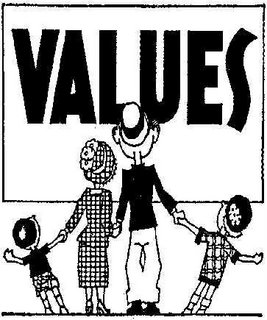6/01/2006
Liberal and Islamic values
 At Orkut somebody (Brent) asked me me how I can adhere to Islamic values if I'm a liberal. Below is my reaction, a presentation of the liberal and Islamic values that I adhere to...
At Orkut somebody (Brent) asked me me how I can adhere to Islamic values if I'm a liberal. Below is my reaction, a presentation of the liberal and Islamic values that I adhere to...Let’s start with the liberal values. Within liberal theories of toleration (source: “Toleration as Recognition” from Anna Elisabeta Galeotti) two main positions are possible: neutralist and perfectionist liberalism.
In the neutral liberal view, the idea is that one set of views should not be favored over others in the public sphere. It means that public action should discount all personal difference that are politically irrelevant (from ethnic origin to affiliations, religious beliefs, moral values, skin color, and sexual preferences). The idea of neutrality is meant to fulfill the liberal principles of equal liberty, non-discrimination, and impartiality by deciding that the state and political agencies have no business in trying to improve citizens according to any conception of what is valuable in life or how they should live.
By contrast, in the perfectionist liberal view, liberalism necessarily presupposes a conception of the human good, which is ethically substantive. This liberal conception is focused on the values of human rationality, autonomy, self-reliance and self-development. A major concern for perfectionist liberalism is to design a proper definition of the liberal good, which must be shown to be consistent with pluralism, with the minimum use of coercion and with the right of each individual to define his or her own good. According to perfectionists, liberal politics presupposes a certain kind of human character (autonomous, independent, self-reliant) and it is sustained by a corresponding set of substantive virtues and values, among which are tolerance, pluralism and diversity. Pluralism is a precondition for individuals to develop an autonomous personality and, hence, the toleration of diversity is a necessary constituent of a liberal society. Thus, for perfectionist liberalism, full potential toleration should in principle be limited to those differences which can be accommodated within the fairly open boundaries of the liberal conception of the good, while the differences which appear incompatible with liberalism are in principle excluded in order to preserve the liberal order and it’s ethical integrity.
I hope that the difference is clear between these two positions. Personally I support the perfectionist view, with a clear conception of the good, based on humanist values like tolerance, acceptance of differences, individual autonomy and universal human rights.
 Some years ago I started to read about the Jewish philosopher Emmanuel Levinas, who writes about humanism / ethics. Not surprisingly, the core values in his philosophy are similar to (perfectionist) liberalism: tolerance, acceptance of differences, human rights, and anti-discrimination and anti-racism. According to Levinas, I am responsible for how I treat another person. I should help people who are in difficult situations, when they ask me for help. Especially vulnerable people who are e.g. poor, and the stranger, the widow and the orphan. People who don’t have enough to eat, or who have no home, or who have lost their partner or their parents; my focus should be on them, to help them. My responsibility to help them is infinitely, I should do as much as I can.
Some years ago I started to read about the Jewish philosopher Emmanuel Levinas, who writes about humanism / ethics. Not surprisingly, the core values in his philosophy are similar to (perfectionist) liberalism: tolerance, acceptance of differences, human rights, and anti-discrimination and anti-racism. According to Levinas, I am responsible for how I treat another person. I should help people who are in difficult situations, when they ask me for help. Especially vulnerable people who are e.g. poor, and the stranger, the widow and the orphan. People who don’t have enough to eat, or who have no home, or who have lost their partner or their parents; my focus should be on them, to help them. My responsibility to help them is infinitely, I should do as much as I can.I found it very beautiful to read these texts from Levinas.
And it was because of reading Levinas that religion came back to me, after it had been gone for a long time. According to Levinas, God is infinite, he is Infinite Goodness. This while human beings are not infinite at all, on the contrary; they are very limited in their goodness, power and how much they can understand. A limited being can never fully understand an infinite being. We cannot understand the incredible size of infinity, we can understand only a very small part of it, just as small as we are. Humans are locked up in their own minds, they can only think their own thoughts. We cannot break out of this isolated world ourselves.
The only person who can liberate me is “the other”, who makes an appeal to me by requesting a response from me. When I meet the other, our relation becomes ethical. Before, when I was alone, I could do whatever I liked, but now I have to take the other into account. I am responsible for how I treat him/her. At that moment behavior can be defined as either morally good or bad. The other liberates me by waking me up, he opens up the prison of my own thoughts by showing to me that there is more in the world out there than just my thoughts, infinitely more. There is more than just my own consciousness (there is the consciousness of the other, to start with), I am not located in the center of the universe, my selfishness is not acceptable. And by seeing a glimpse of the infinity outside my own mind, which I can see thanks to the liberation by the other, I can see a glimpse of God.
 In short (not very short) this is what I wanted to say about liberal values and the humanism of Levinas. Now, how is this linked to Islamic values?
In short (not very short) this is what I wanted to say about liberal values and the humanism of Levinas. Now, how is this linked to Islamic values?Some time ago I read an article from Fouad Laroui, a Moroccan writer (and scientist) in the Netherlands. I was thinking that he expressed the main idea of Levinas’ philosophy in that article, the idea that I should treat the other as a fully and equal human being, always, not as an object. I decided that I would like to talk to him and I sent him an e-mail at the university. We met in a café and he had also brought a friend with him, a Moroccan philosopher from France (Hamid Barrada). It was Barrada who sowed me the link between Levinas and the Islam. He said that Muslims also believe that there is only one God, who is infinite, and that you can see a glimpse of him through contact with fellow human beings. I started to read more about the Islam and I spoke with Muslim friends from Orkut in msn. I saw many similarities between what Levinas wrote and what I read about the Islam, e.g. also the emphasis on helping the poor.
So this is the part of the Islam that I am interested in, in values / virtues like tolerance, peace, solidarity, a community spirit, helping the poor, and to try your best to be a morally good person.
Brent, you can give me a description of what you consider to be common Islamic values, but it is doubtful if these “values” (what you described where more practices in certain situations than values) are really that common, and it doesn’t mean at all that I would have to accept the values you mentioned blindly. If you want to say that I am almost a Muslim, that’s correct, but then it means that I am a tolerant, moderate peaceful Muslim (5% missing) who adheres to liberal and humanist values.
Comments:
<< Home
Niet relevant voor deze entry, maar hier een stuk waarin aangetoond wordt dat het idee dat terrorisme en Islam vaak samengaan onzin is: http://punkassblog.com/2006/06/03/does-terrorism-muslim/
Post a Comment
<< Home
